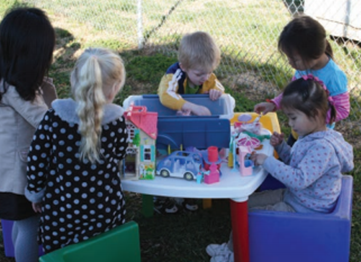12.1: Introduction
For many educators of young children, the terms history and social sciences conjure up images of children studying past presidents, learning about other countries, and exploring related topics during the primary school years. Yet, a look at young children’s emerging sense of identity, their growing interest in the larger social world in which they live, and their developing understanding of time and place shows that history and social sciences are relevant to them also.

Young children are natural historians when they talk about their experiences and enjoy hearing family stories of “long ago.” They are intuitive geographers when they recognize the route to the grocery store and create a map of the preschool room. Children are simple ecologists when they worry about a plant that is wilted or a bird’s egg on a nature walk. They learn about democracy through their participation in shared decision making and taking turns on the playground. Their interactions with other children acquaint them with the diversity in culture, languages, backgrounds, and abilities in society. Young children are also everyday economists as they begin to understand how money, bartering, and exchange work in the world around them.
Preschoolers’ understanding of history and social sciences naturally derives from their expanding knowledge of the world and their place in it. It also provides a foundation for the study of history, culture, geography, economics, civics and citizenship, ecology, and the global environment that begins in the primary grades and continues throughout life. Those topics are important because they provide a basis for understanding the responsibilities of citizens in a democratic society, the legacy of past generations who built society, the importance of caring for the natural world, and the rich diversity of other people.
In preschool, they are introduced to these important issues through everyday activities such as caring for a plant, remembering a recent trip to the zoo, deciding as a group on a name for the class pet, creating a shoe store, engaging in imaginative play with adult roles, or sharing family traditions from home. In other words, young children learn about history and social sciences from personal experiences, as they are enlisted into a preschool curriculum, and also from their experiences at home. [1]
- The California Preschool Curriculum Framework, Volume 3 by the California Department of Education is used with permission ↵

